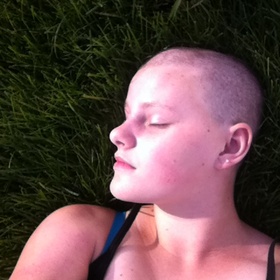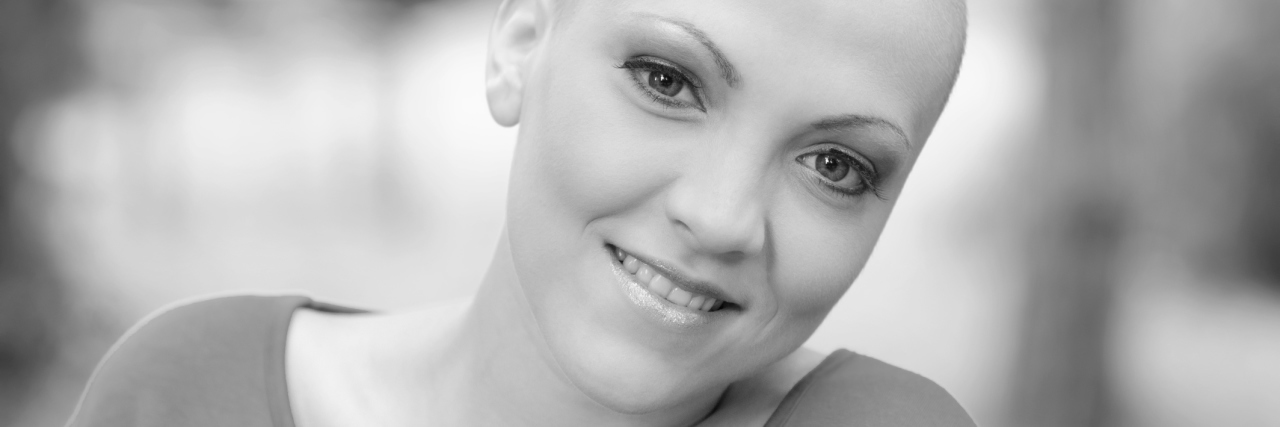What It's Like Losing Your Hair as a Teenager Due to Alopecia Areata
Alopecia areata, an autoimmune disease in which my white blood cells attack the hair follicles, causing the hair to fall out. When I was young this was a name I, like many other children, wasn’t familiar with. It is a name I have grown to know, now that it applies to me.
My hair first started falling out when I was 14. Clumps falling to the shower floors, leaving behind bald spots that grew in size. As a young teenager growing into my confidence, trying to find my role in this world, the loss of my hair was a big hit. My curly, golden locks had been what I found most beautiful about myself, one of the few things I loved when my self-esteem plummeted. As time passed, I spent my time worrying over the progression of my alopecia and finding new ways to hide my hair loss. It’s funny how when you start to lose you hair, you become hyper aware of all the disdainful comments your classmates make about being bald or balding. You realize how deeply your peers value hair as a component of beauty.
My freshmen year of high school, so much of my hair had fallen out that I decided to shave what was left off. I didn’t want to live my life in a constant state of false promises and hope that would never come to fruition. I didn’t want to spend my school days afraid someone would rip my itchy hat off and expose me. Shaving my head was a freeing yet frightening experience. Going to school was a nightmare, wig or not. I was different, and everyone stared at me. (Probably not everyone, but it sure felt like it.) The beautiful wigs my mother had bought me gave me migraines, and I started going to school with my bald head on display. Being the only bald girl at my school of over a thousand students was terrifying in its own unique way. Some asked if I had cancer, some asked if I’d donated it, some snuck pictures of me. I did what I had to; I pushed my way through and took it one day at a time.

It’s a few years later, and I still face difficulties with my alopecia. I can safely say I never expected my life as a 16-year-old girl to be like this: bald and chronically ill.
Some days are better than others. My alopecia is interesting in the fact that my hair grows back after it falls out. I always tend to have at least one bald patch, and when too much hair falls out, I shave the rest back down to even it out. I prefer going out in public bald rather than partially, almost, nearly bald. This is a cycle I have grown used to, and as such I allow myself no hope when my hair grows out (to a full inch!) or when it doesn’t fall out for a while. I don’t partake in my friends’ and family’s excitement and hope. They think I’m getting better, and it’s so frustrating to always have to explain that I’m not.
There are some days still where I cry and cry, just missing my hair, just wishing it would stop falling out. Days where my hair falls out more than usual and I have to rebuild my confidence once again. Days where my eyelashes or eyebrows fall out, and I do me best to pretend it hasn’t broken me. Days where, “No one wants a bald girlfriend,” rings in my ear. The unpredictability and uncertainty of this disease is eternally bothersome, and I don’t think I’ll ever get used to it. There are some days where I find myself looking at all of the other girls’ hair, aching with the remembrance of what my hair used to feel like. Remembering what it used to feel like to look into the mirror and be happy with the reflection staring back at me.
I’m better than I used to be. More often than not I walk into school with my head held high, pushing all my doubts to the back of my mind. I don’t even notice when people stare at me anymore. I don’t make snap judgements when I see someone who would be viewed as abnormal by most. I value what people carry inside themselves rather than what they look like. I try not to care what others think of me. And some days, dare I say – I even feel beautiful, bald head and all.
I think this is what healing is and always will be like. It’s not linear. My happiness and confidence is temporary.
Although relapse is imminent, I find hope in the logic that if my happiness is temporary, my pain must be temporary, too.
We want to hear your story. Become a Mighty contributor here.
Thinkstock Image By: prudkov

